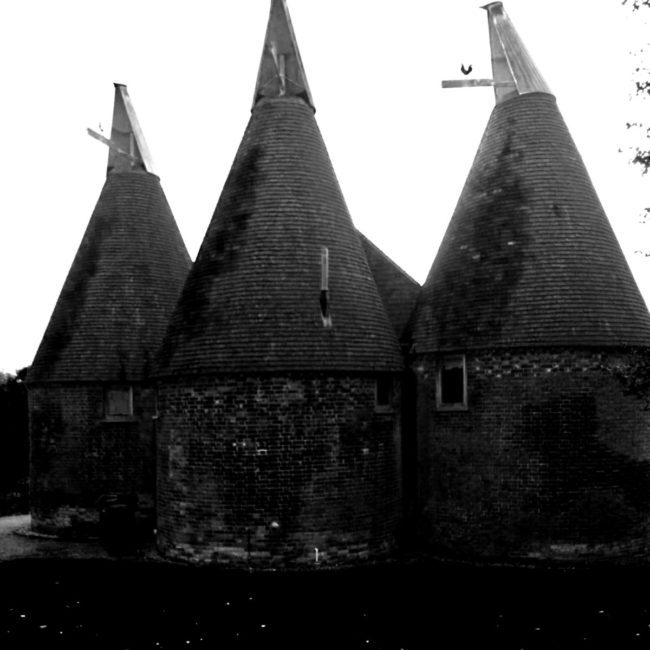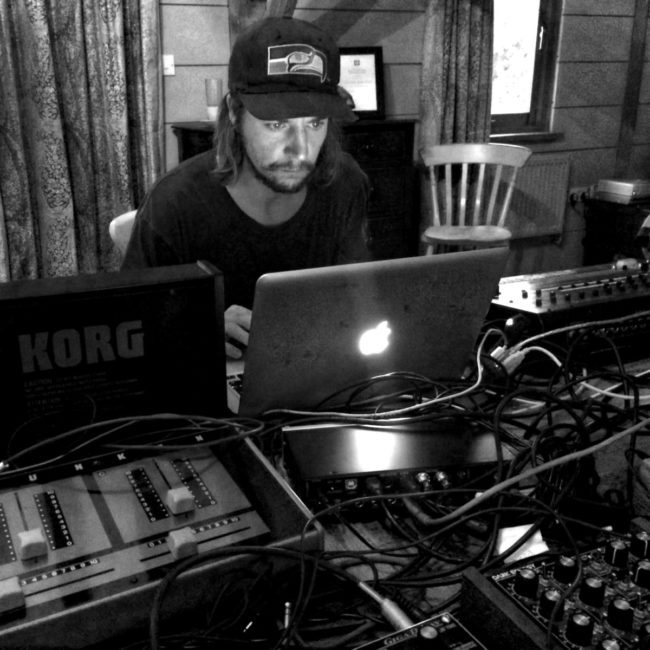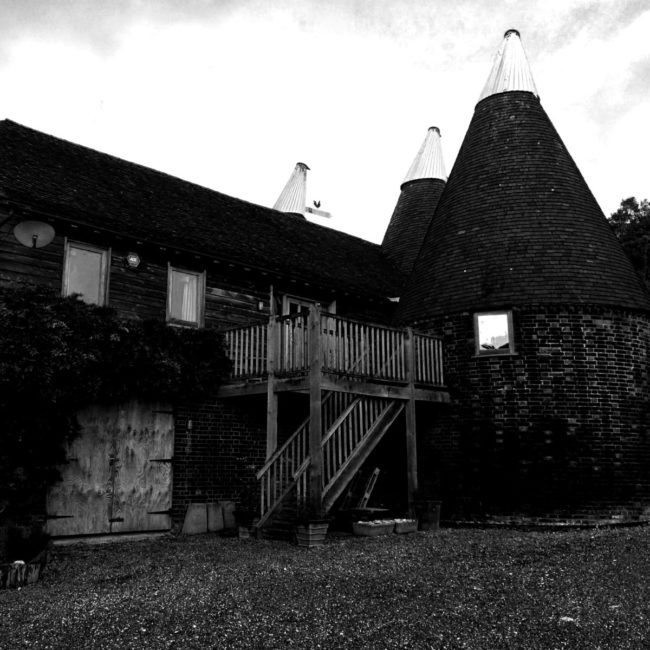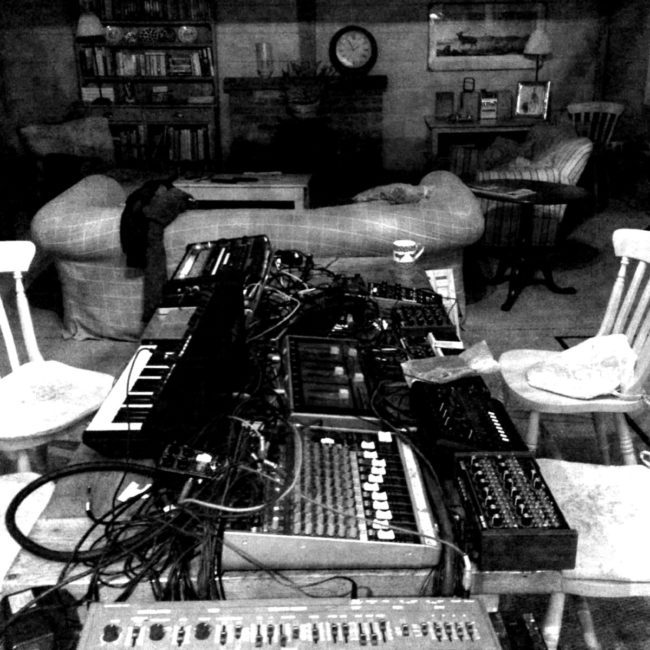Some records are born out of meticulous planning, while others arrive almost by accident. Oast, the long-awaited debut album by Kommune, falls firmly into the latter.
Consisting of George Thompson (Black Merlin, Spectral Empire), Kyle Martin (Land Of Light, Spectral Empire) and Jonny Nash (Land Of Light), ‘Oast‘ was recorded in October 2014 over a weekend in a converted barn in Kent, capturing three friends improvising on the spot four long-form pieces of deep, hypnotic ambient techno that beam with raw analogue beauty.
At the time, Kommune was never intended to be a band in the traditional sense. The trio had already crossed paths in different guises – as Land Of Light, as Spectral Empire, and through one off gigs as Kommune at LN-CC in London and Hamburg’s Golden Pudel.
Kommune was a space to explore something different: live analogue improvisation with no agenda other than curiosity and connection. What emerged was music that is both meditative and restless, rooted in the deep pulse of the TR-808 drum machine but lifted into strange, unplanned directions by synths, effects chains and instinctive interplay.
For a decade the recordings remained unheard outside their inner circle, until Tako Reyenga of Second Circle / Music From Memory stumbled across them and insisted they see the light of day. Today, Oast feels not only like a time capsule of a particular moment but also a timeless document of friendship, serendipity and the unrepeatable magic of pressing record at exactly the right time.
Interview by Tom Durston
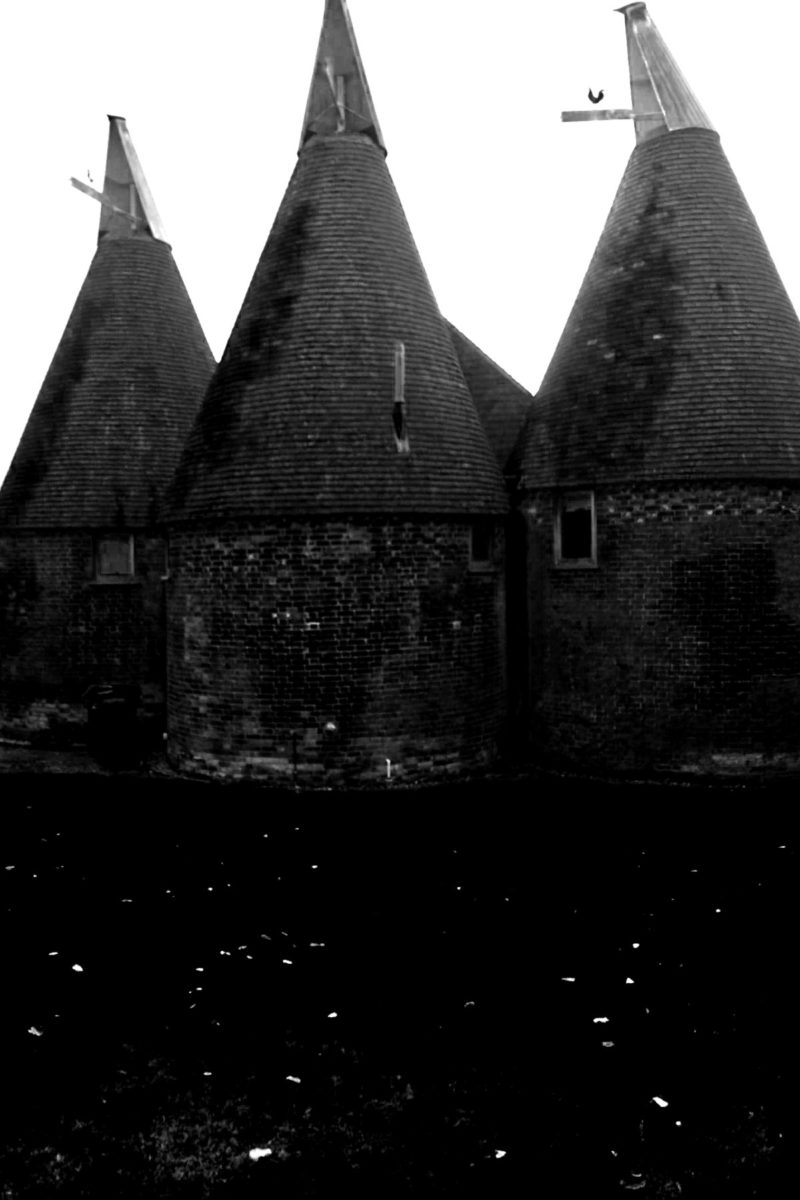
"The interplay between us but also the choice of what gear to bring played a big role. The combination of well-chosen instrumentation, but also being limited to just those pieces of gear helped bring a cohesive sound to the record in the end."
Hi guys thanks for taking the time to speak about Oast – first off congratulations on the album, it’s a magnificent body of work. The press release describes Kommune as a project that arose organically from your shared musical journeys. What sparked the decision to form Kommune, and how did it differ from your other projects at the time?
There was never a distinct decision to form Kommune, as mentioned it just arose organically from some ideas and gigs that we played together. At the time, LN-CC was a bit of a creative hub and we had played there quite spontaneously a few times under various guises… Land Of Light played their debut gig there in 2012 and the next year Spirit Bear Mezcal Ensemble, which included Jonny and Kyle played the improvised gig there that spawned the release with LN-CC records.
The three of us had been chatting and wanted to explore some live analogue machine music, so decided to play there. Of course, if you know the Land Of Light or Spectral Empire records, you will hear that they are on a completely different sonic wavelength than Kommune but the theoretical approach is very similar in regard to performance.
You recorded Oast live and fully improvised over two days. Can you talk us through that recording session in the barn – how did you come across the barn, what was the atmosphere like inside, and how did it shape the overall sound of the album?
To celebrate Kyle’s birthday we decided to visit this barn in Kent, England. They have these very distinctive barns in that part of the country called Oast houses. It is very old and has a lot of character. The idea is that it was so cut off from the world that we could spend the weekend without distractions to concentrate. The intention wasn’t necessarily to make as record, that just came as a by-product of the weekend as we primarily just intended to have a jam for fun.
The album feels dark and is very much like a conversation between machines. How much of that interplay was intentional, and how much was simply letting the machines guide you?
As we had played so much together, it was easy to connect musically. George and Kyle had DJ’d back-to-back most weeks for many years as Spectral Empire and before that and Jonny and Kyle had played Land of Light live for almost two years by this point.
The interplay between us but also the choice of what gear to bring played a big role. The combination of well-chosen instrumentation, but also being limited to just those pieces of gear helped bring a cohesive sound to the record in the end.
The TR-808 plays a central role on Oast. What drew you to this drum machine for this project, and how did you approach programming it to achieve such a hypnotic feel? Why not use the TR-909 or others?
The 808 is definitely well sought after for a reason as it just has ‘that’ magic to its sound. The 909 has a much tougher vibe to it and the record would not have had the delicate qualities that it has had we used that machine. At the time we didn’t have a 909 either.
As said though, this record arose organically from a series of events and it just so happened that George brought his 808, as he had done for the earlier Kommune gigs and as in the record, it played a central role in those gigs too.
Improvisation is at the heart of Oast. How do you balance spontaneity with maintaining the album’s flow and coherence over such long-form compositions?
This is hard to put your finger on, improvisation is just listening and knowing when to do your thing. A lot of the performances weren’t really spoken about at the time, we just did them subconsciously, we would find a groove and then hit record. All of our past musical experiences together led us up to this point where we recorded this, kind of by accident.
With the album consisting of four long-form tracks, are they reflections of different times of the day, personal moods or thoughts?
I guess the listener can decide this, but the truth is that the record is actually presented in the order that they were recorded. Side 1 is the first one we recorded and Side 4 the last. Perhaps there was more at play than we know but they just came to us in the moment.
You performed as Kommune only a handful of times, including in Hamburg at Golden Pudel and in London at LN-CC. Did those live experiences feed directly into how you approached this recording session?
Absolutely they did. But also, the live experience of us playing together as Spectral Empire and Land of Light did too. The whole time, subconsciously we were experimenting and getting used to playing together live. The experiences of using particular pieces of gear in a live performance, knowing what would work was a big part of that too.
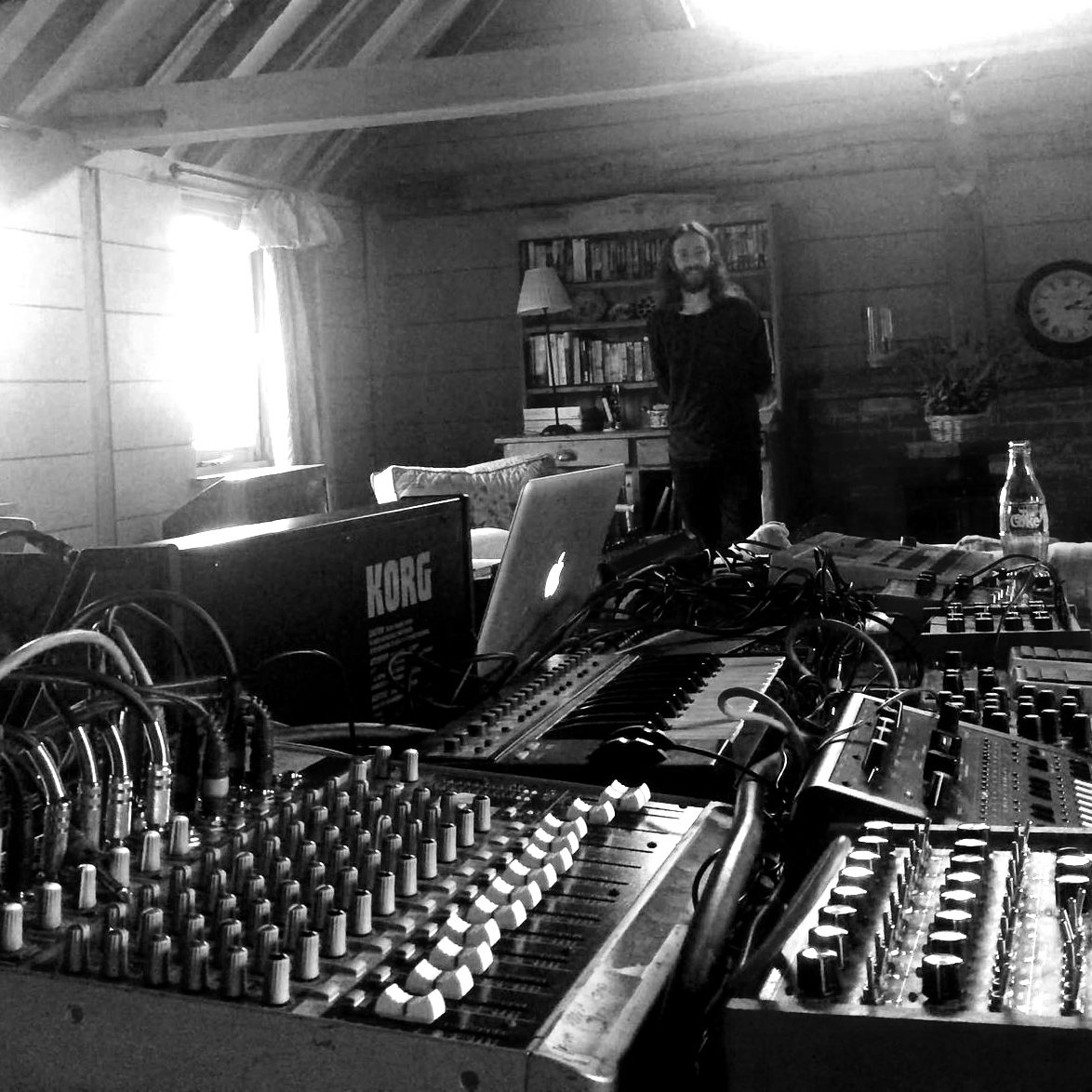
"It is very fitting and poignant to all of us that it is Tako releasing this record as it just cements this friendship that we all have. But just like so many elements to the creation of ‘Oast’, this just came about organically."
The press release hints that this project could have remained undocumented. What made you decide to finally release these recordings a decade later?
As mentioned, this record came about almost by accident but there is another part to the story here. Tako, who runs Second Circle/Music From Memory was introduced through Jonny when we all DJ’d in Salon Des Amateurs in Dusseldorf. We all became close friends and spent a lot of time together during those few years, playing DJ gigs and hanging out.
For some reason, Tako had never heard ‘Oast’ until recently and didn’t know of its existence but when he did he was blown away by it. It is very fitting and poignant to all of us that it is Tako releasing this record as it just cements this friendship that we all have. But just like so many elements to the creation of ‘Oast’, this just came about organically.
There’s a strong sense of friendship and shared curiosity running through Oast. How important was that personal connection in shaping the music?
This has been spoken about a bit already in the interview, but the record ‘only’ came about because of our friendship, as it was really a result of us having a bit of fun, jamming together and hanging out. Nothing was planned, it’s a product of just hitting the record button in the moment.
By serendipity, the final piece of the puzzle was the actual physical release, which also came about from our friendship with Tako. It should be noted that we also played with another close and talented friend Merrick Adams from time to time and if we had been planning to actually make a record he would have been there too, but as mentioned, the whole thing was somewhat an accident.
Looking back now, what does Oast represent to you? Do you see it as a time capsule of a particular moment in your lives, or something that still resonates with your current musical outlook?
Shortly after the recording was made Jonny moved away to Bali and then Holland. George left London and as of yet hasn’t returned. Although we all remain close friends, we certainly don’t see each other every second day and don’t get to hang out often. In a way it kind of marked the end point in that special chapter of our lives and as the recording was made more than a decade ago and a lot has changed since then.
But to all of us, this time capsule as you call it is a very special body of work. It’s not often that groups of friends get to have a physical document of their friendship like this and for that we feel very lucky. Musically, when we listen to the album, we are surprised at how musically it stands up to what is around nowadays. It is an old recording but quite timeless musically.
What synths, sequencers, or effects units were central to creating the textures on Oast? Were there any surprising pieces of gear that shaped the sound in unexpected ways?
The instrumentation of Oast, as mentioned, was the result of the gear that we owned at the time and the experimentation of those machines. This resulted in the choices we made when we decided what to put in the car that day.
There are a few of the sounds that arguably are recognisable and could be made on a variety different types of gear, such as TR-808, Xoxbox (TB-303), SH-101 or the Korg MS20. However, there are three very distinctive layers in the sound that are integral to the sound of Oast.
A little machine called Utopia Synth, fed into the Moogerfooger Murf pedal. The Doepfer Dark Time/Dark Energy combination playing all the high-pitched synth lines. Lastly, the effects chain of the sends on the desk were fed into the Boss DD20 on loop mode, followed by the Jomox T-Resonator.
Since the recording was entirely live and without overdubs, how did you manage the technical side of things – were you each locked into specific roles, or did you switch gear and responsibilities throughout the session?
When recording we mostly used certain devices, as we would when playing live…. George on the 808 and MS20, Jonny on synth pads and Utopia Synth and Kyle on desk, T-Resonator, 303 and Doepfers. That kept us busy enough!
Finally, do you have anything else you’d like to share with us?
Big shout out to Gordon Pohl who’s premasters made a huge impact on the sound of this record!
‘Oast’ is out now via Second Circle. Order a vinyl copy from Inverted Audio Record Store and digital from Bandcamp.
TRACKLIST
1. I
2. II
3. III
4. IV
